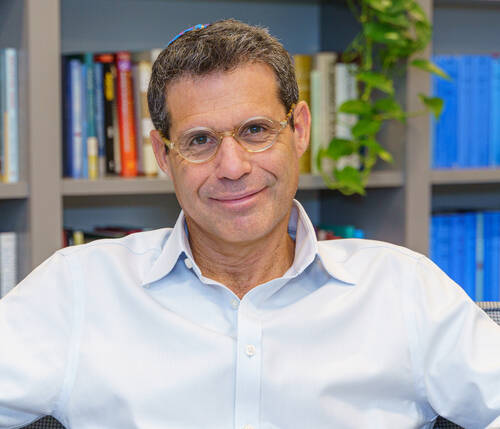Only One Request from God
Only One Request from God

One of my favorite authors, Haruki Murakami, writes in his book 1Q84:
“If, as the dowager had said, we are nothing but gene carriers, why do so many of us have to lead such strangely shaped lives? Wouldn’t our genetic purpose—to transmit DNA—be served just as well if we lived simple lives, not bothering our heads with a lot of extraneous thoughts, devoted entirely to preserving life and procreating? Did it benefit the genes in any way for us to lead such intricately warped, even bizarre, lives?”
If the goal of Rosh Hashanah and Yom Kippur was to make us physically stronger, faster, and healthier, they would have indeed served the purpose of ensuring the continued existence of the human race. But instead, they focus on the hard work we should embark on to become a better spiritual and moral version of ourselves. Not only do the High Holy Days not focus on survival, but at times they promote values like selflessness and generosity that seems to be counter-intuitive to survival.
The process of spiritual improvement does not begin with the High Holy Days, but 29 days before, at the start of the Hebrew month of Elul. The rabbis realized that like everything important in life, one must ease into it. Many of us still remember the pain after going to the gym for the first time. Even the smart ones (which I never was) who knew not to push too hard too soon still ended up with sore muscles because the body needs time to get used to rigorous physical work. The same is true for spiritual fitness. It is not wise to show up cold for the High Holy Days. One needs to slowly and gradually prepare the neshama, the soul, for these days.
There are a few traditions that are associated with the month of Elul:
The shofar is blown each morning (except on Shabbat) from the first day of Elul until the day before Rosh Hashanah. Its sound is intended to awaken the soul and start off the spiritual journey that happens throughout the month. At Temple Beth Am, we meet at the beach on the first day of Elul just before sunrise for a special Service that includes the first Shofar blowing (see page 9 for details).
Selichot (specific penitential prayers) are recited during the month of Elul. Like in many congregations, we will have our Selichot Service the Saturday night a week before Rosh Hashanah (Saturday, September 17 at 8:00pm).
Elul is a time of introspection and personal stock-taking, known in Hebrew as cheshbon hanefesh—literally “an accounting of the soul.” We take time for personal reflection around our actions of the past year, seek forgiveness from those we have wronged, and work on repairing our relationships with God and even with ourselves.
During Elul, I will be sharing a series of videos focusing on the main themes of the month, and Cantorial Soloist Marcy will record several songs that will bring our souls higher and higher. But we also have a special task for you. It is customary to read Psalm 27 during this time. Verse 4 begins with the words “One thing I ask of God, this is what I seek.” If you had only one request from God this year, what would it be? During Elul, we will ask you to submit your answers.
Judaism gives us the greatest gift by allocating a time on the calendar to remind us that we are much more than gene carriers and DNA transmitters. We each have a spirit that was given us by God and it is our task to take care of it and bring it as high as possible.
Thu, July 31 2025
6 Av 5785
Upcoming Events
-
Friday ,
AugAugust 1 , 2025TODDLER ENRICHMENT PROGRAM
Friday, Aug 1st 10:00a to 11:15a
-
Friday ,
AugAugust 1 , 2025Shabbat Service
Friday, Aug 1st 6:30p to 7:30p
-
Wednesday ,
AugAugust 6 , 2025Mah Jongg
Wednesday, Aug 6th 1:00p to 3:00p
-
Thursday ,
AugAugust 7 , 2025Canasta
Thursday, Aug 7th 1:00p to 3:00p
-
Friday ,
AugAugust 8 , 2025Shabbat Service
Friday, Aug 8th 6:30p to 7:30p
-
Saturday ,
AugAugust 9 , 2025Men's Club Summer Dinners at Cafe Sole
Shabbat, Aug 9th 6:30p to 7:30p
-
Monday ,
AugAugust 11 , 2025BOOK CLUB - THE OVERSTORY - Richard Powers
Monday, Aug 11th 10:30a to 12:00p
-
Tuesday ,
AugAugust 12 , 2025100 Women Who Care
Tuesday, Aug 12th 5:30p to 6:30p
-
Wednesday ,
AugAugust 13 , 2025Sisterhood Mitzvah Project- Lunch Making
Wednesday, Aug 13th 10:30a to 11:30a
-
Wednesday ,
AugAugust 13 , 2025Mah Jongg
Wednesday, Aug 13th 1:00p to 3:00p
Update this content.
Come Together
Something meaningful and dynamic is happening here at Temple Beth Am. It springs from the warmth of our welcome and the energy of our actions. We call it: Kulanu - All of Us Together.
Join UsUpcoming Events
-
Friday ,
AugAugust 1 , 2025TODDLER ENRICHMENT PROGRAM
Friday, Aug 1st 10:00a to 11:15a
-
Friday ,
AugAugust 1 , 2025Shabbat Service
Friday, Aug 1st 6:30p to 7:30p
-
Wednesday ,
AugAugust 6 , 2025Mah Jongg
Wednesday, Aug 6th 1:00p to 3:00p
-
Thursday ,
AugAugust 7 , 2025Canasta
Thursday, Aug 7th 1:00p to 3:00p
-
Friday ,
AugAugust 8 , 2025Shabbat Service
Friday, Aug 8th 6:30p to 7:30p
Privacy Settings | Privacy Policy | Member Terms
©2025 All rights reserved. Find out more about ShulCloud

